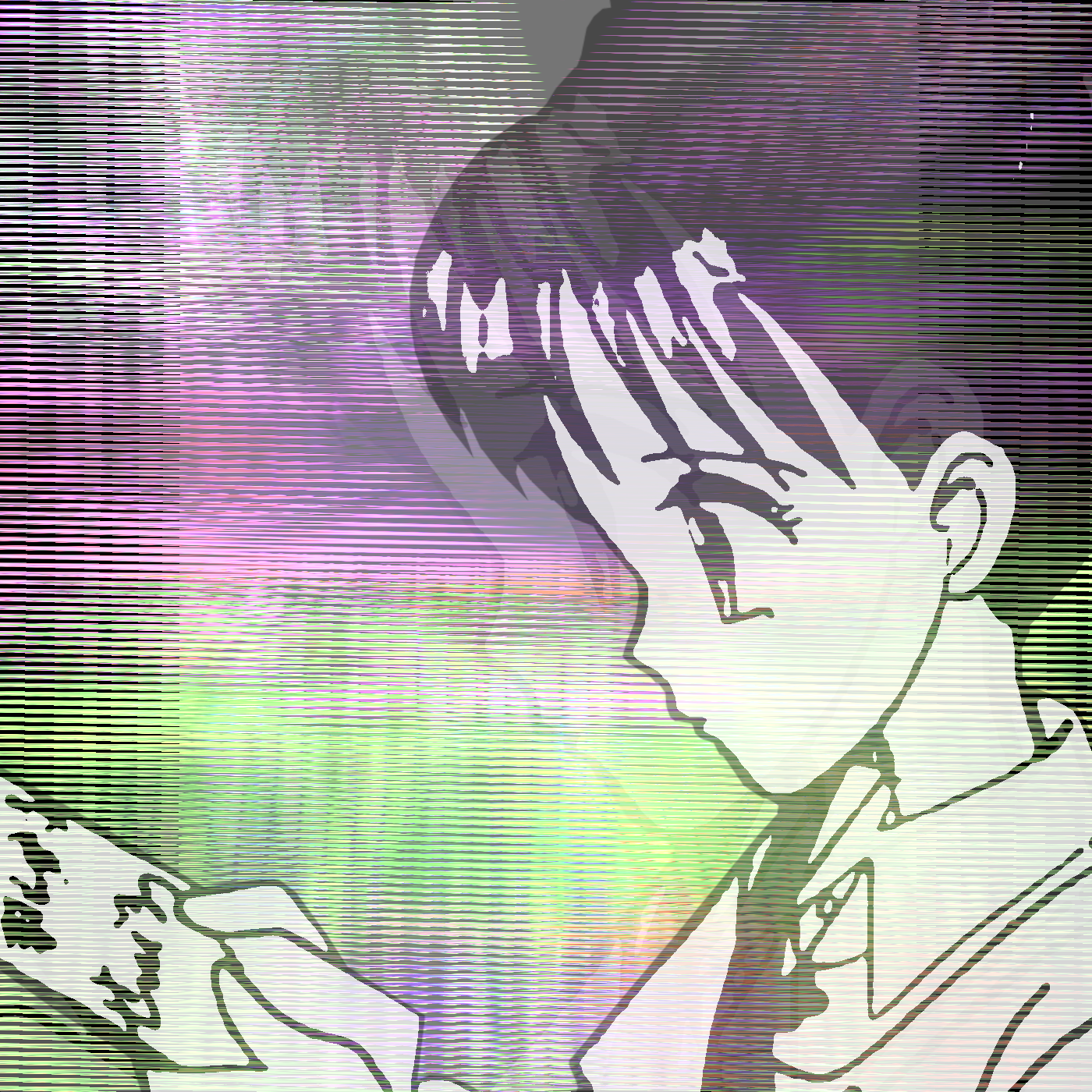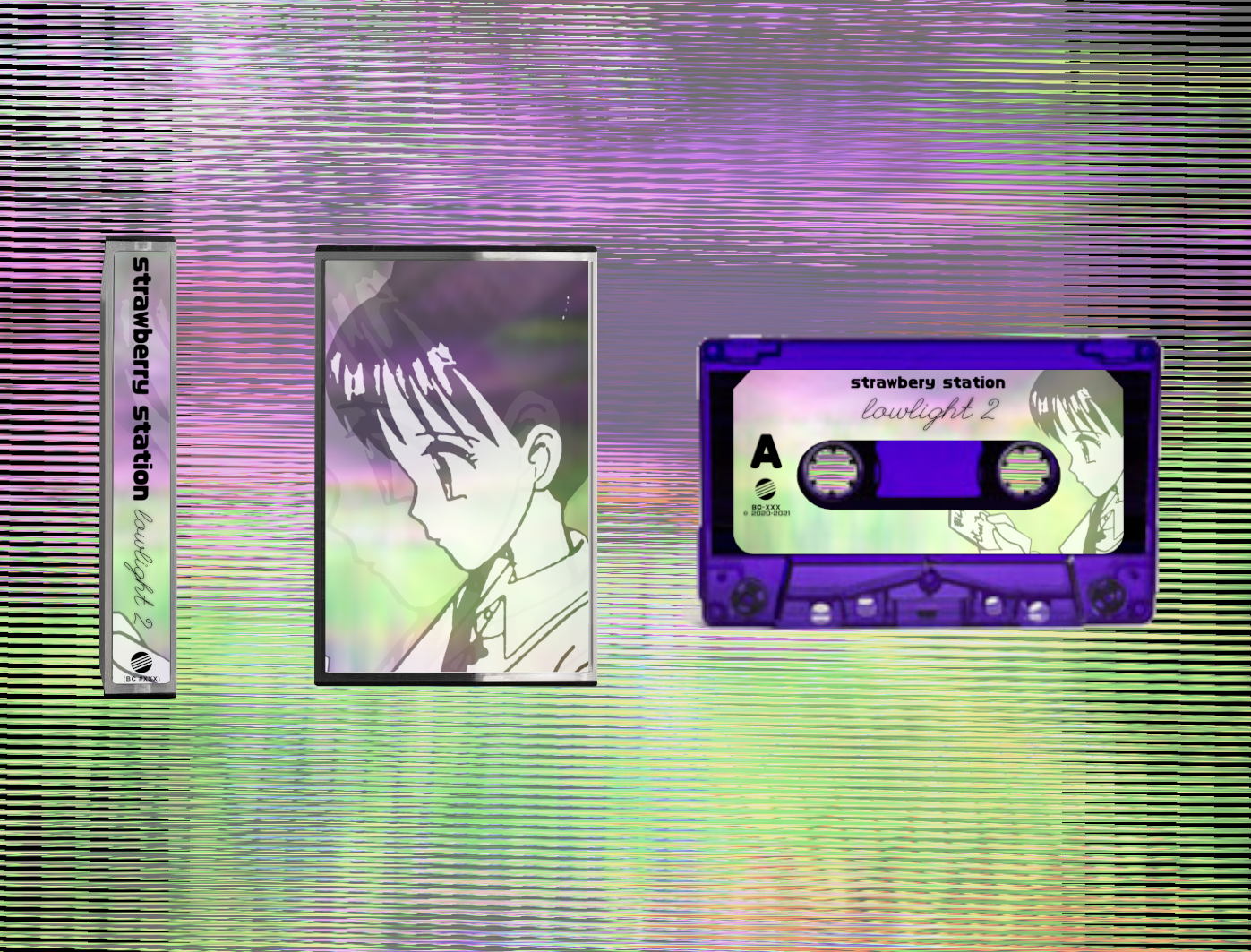Album Review
Lowlight 2
by: Strawberry Station
Written By: BigFingerRo
Published: September 16th, 2021
If there’s one aspect that is definitive to vaporwave, it’s nostalgia. The same goes for synthwave, future funk, and all those genres that came to be with the ‘80s revival that has been going on in the last few years. All of these genres are defined, at least partly, as being a sort of lamentation for the loss of certain aspects of culture: fashions, certain sound tropes, certain places, and the general feeling of novelty there was towards technology. But more than grieving them, these genres celebrate those aspects, presenting them with a sleek coat of varnish so as to show them in a new context.
But the fact remains that these genres were born as a way to seek familiarity. It’s not terribly unlike what one might go through after they’ve lost a close relative. One might find themselves going through their belongings, remembering the times spent together, and later, trying to re-experience their presence. A cardigan with that special scent, a wristwatch only for special occasions, the uniform worn to work for so long. The same thing happens with culture; one might find themselves looking for these “talismans,” because their absence is simply too painful. In being defined by nostalgia, all the aforementioned genres are defined by loss. Music, among all art-forms, is reproducible in ways that no other artform is, and thus, can be revived more easily
Which brings us to the album in question. What better genres to explore loss, regret, and, of course, the acceptance and optimism for the future, than these? Where else might one find this kind of respite? In a statement for UD, Strawberry Station told us:
“It’s a story of how I processed living through the pandemic and lockdown on my own in a foreign country. It covers all the emotions I’ve been through in the past two years – isolation, depression, loneliness, and regrets about missed experiences. But also acceptance, hope and optimism for the future.”
Strawberry Station presents the listener with an album that is, by his own admission, a departure from his body of work. Lowlight 2 is a multi-genre affair, notably distant (for the most part) from his usual future funk. Apropos to what inspired it, the album has a very wide range of emotions, with very distinguishable passages of melancholia. The whole project is imbued with a lingering feeling of lethargy, which at times becomes much more apparent. Certainly, a feeling that will come across as all too familiar. But, as we’ll see later in the album, this is not a permanent state of being. And that, above all things, is the most important one to take away from this project.
Now then, on to the album!

Album Art By Strawberry Station
(As the tracklist was not finalized during the review process, the final tracklist differs from what is presented below.)
“Yes, No, Maybe”
Somewhat reminiscent in form and feeling of HOME’s Resonance. It fills the listener with a sensation like looking out the window of a spaceship. The repetition of the main “phrase” of the synth creates a sensation of calm wonder, a sort of relaxed uncertainty.
“Things You Can’t Fix”
The closest in sound to Strawberry Station’s former work that the album gets. The song opens with a robust bass section, punctuating with a playful “Oh well!” It’s a very stark (yet friendly) declaration of powerlessness. It’s a call to snap out of a funk and spring into action regardless of bad circumstances, which is very appropriate. This track marks the start of an emotional high in the album, if placed a bit early. This peak is signaled not by the tune, but by the beat.
“Still Here”
The strongest song in the album. The beat in this track is decidedly in the trap side, which is then balanced by the synths, which keep it “on topic”. Strawberry Station noted this album marks his debut on the vocal section, and he does so outstandingly. Combining soft, harmonic passages with strong rhymes, he states, in very succinct terms, what he wants this whole project to be: “I’m staying right where I am, and I’m still here, under cloudier skies.”
“Stay Strong”
A combination of the first and third track. Much more emphasis is placed on the beat, similar to a french house track. The feeling of uncertainty from before is explored again, in a much more confident manner. The vocals remain soft, as they were in “Still Here”, so as to signal the stability the artist had found and which inspired the creation of the album.
“Comeback Kid”
With certain shades of Trevor Something and Slick Moranis, the new sound grows more and more confident, this time entering the realm of synthwave. Of particular note are the vocals, which demonstrate how in his element Strawberry Station is with the genre. The faster pace and the lyrics match the title of the song, which continues the line of thought presented in the last track.
“Stay With Me”
In a marked change of moods, the album goes from synthwave to lo-fi. The title speaks of a separation, a plea of sorts. Which is, again, very appropriate to the subject. So as to not lose unity, the synths from the first tracks are reprised, and the sweet and playful voice sample used drives the point home in an almost painfully pretty way. It’s almost as if one were hearing the voice of a loved one in their mind.
“See The Sunrise (Ft. Phaun)”
The second cheeriest track in the album by far. If the rest of the album was an exploration of present circumstances, See The Sunrise is the setting of a goal and a promise for the future: Eventually things will be better. The song states this with complete calm and conviction. It’s reminiscent of Macross 82-99’s “Aogashima Island.”
“Peace”
The mood changes once more rather drastically, this time into vaportrap. While not increasing speed, the song is very focused, as if made in a moment of pure inspiration. The vocals also change into something one might expect from the later works of Chester Bennington, only softer, so as to retain unity with the rest of the album. The most dramatic song in the album. While short and focused, it has a clear feeling of tension not seen throughout the rest of the album. It imbues the listener with the feeling of taking a big decision.
“My Oh My”
“My Oh My” feels like the climax of the album. It is the cheeriest track, and, in following with the themes explored throughout the album, speaks of a bright future waiting past the current hardship. In contrast with “See the Sunrise”, “My Oh My” speaks as if it were already in said future. Compared to the rest of the album, it’s relentlessly happy and playful. It would feel out of place in the album, were it not for the drums and beat, which keep the song in the context of the rest of the project.
“Filling In the Gaps”
Sounding like an early Aphex Twins track, “Filling In the Gaps” is once again a combination of the moods of two previous tracks. Here, the listener is presented with the focus of “Peace,” combined with the careful confidence of “Comeback Kid.” While one of the shortest tracks, it serves as a bridge between the earlier fantasies and real life.
“Bright Side”
We see some of the ideas explored earlier in the album revisited here. We have the vocals from “Comeback Kid”, the “call to action” feeling of “Things You Can’t Fix”, plus the addition of guitars and the fastest beat in the album. So as to cement its point, the album begins to close with this invitation to be optimistic while reminding that looking on the bright side means acting upon the things one is optimistic about.
“Bright Side (Reprieve)”
Finally, we reach the end of the album, which restates what Bright Side did, but shifts the pitch of the melody, giving it a sense of finality. But most importantly, so as to make its conclusion clear, the track restates (while lending the vocals more protagonism) what mattered most in the last track, and what is ultimately the whole point of the album: “we cannot erase the past, it’s a losing game”.

You can grab a copy of this cassette here from Business Casual Starting 9/17!
And so the album ends, in stark contrast to its hesitant opening, with complete confidence. This album shows us a more integral artist, molded by circumstances into a richer, more versatile musician. While certain passages feel slightly less confident than the others, the project manages to remain a cohesive story, and states its point loud and clear. This project, in line with the genres defined earlier, is defined by loss, but more so than loss, the will to overcome and dream of a better future.
Strawberry Station
Get The Album!
Score: 4/5
